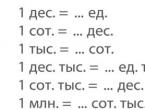Note the meaning of the phraseological unit of Sisyphus labor. What is Sisyphean Labor? The meaning and origin of phraseological units. See what "Sisyphean Labor" is in other dictionaries
Since childhood, each of us has probably heard the catch phrase "Sisyphean labor". What does it mean? Who is Sisyphus and what was he forced to do? Let's figure this out, and at the same time remember other phraseological units that came to us from ancient times.
In the myths of ancient Greece, there is such a character as Sisyphus, who was the king of Corinth. Sisyphus lived merrily and happily in his luxurious palace, cunning, deceiving and dodging. His victims were earthly people who had no power over him. Once he decided that even the gods could be outsmarted, for which he later paid dearly. Its history is as follows. When he realized that the god of death, Thanat, had come to him, Sisyphus distracted him by deceit and put him in chains. From that moment on, people stopped dying, and the gods of the kingdom of shadows were deprived of the gifts that living people gave them for their dead relatives.
Zeus found out about this outrage, who became angry and sent the god of war Ares for Thanat, demanding that he be immediately released. After his release, he immediately plunged the wicked Sisyphus into his kingdom of shadows. Hades and his wife Persephone waited a long time for sacred gifts from the wife of Sisyphus, but all in vain, since he had warned her in advance that no one would bring any gifts for him. Here again Sisyphus decided to be cunning, announcing to the gods the obstinacy of his wife, who supposedly does not want to part with her wealth. He promised Aida to deal with his wife, for which he needed to visit the earth for a short time, but he immediately promised to return back.
The formidable Hades, just like Tanat before, believed the liar and returned him to earth. Once at home, Sisyphus called the guests and threw a noble feast. Once again, he dared to laugh at the gods. The gods do not forgive this, but the deceiver did not even want to think about it. Sisyphus was thrown into the kingdom of shadows and received a terrible punishment as punishment. Every day, from the foot of a high mountain, he was forced to roll up a huge heavy stone, but, having almost reached the top, the stone fell down. This goes on forever. Sisyphean work is hard and useless, but such is the will of the gods. This myth can teach us a lot if we read it carefully and think carefully. Before you laugh or deceive at someone, remember the Sisyphean work - so meaningless and hard.
Not only Sisyphus received punishment from the gods. Tantalus himself, in the same place in Hades, is forced to stand up to his throat in clear, transparent water and see branches with luxurious fruits in front of him. He is terribly thirsty and hungry, but bowing down to take a sip of water, he sees how it goes through the ground, and stretching out his hands to the fruits, he realizes that he cannot reach them. These torments were given to Tantalu for ridicule and pride in relation to the gods. We must firmly remember that before committing any act, we must think it over. So it is in work. Having taken up the task, you should plan everything so that it is not Sisyphean labor (in vain and unnecessary to anyone), but a really necessary and useful thing. By the way, the creators or did Sisyphean work, the meaning of which is meaningless, useless work. They were not very familiar with the laws of physics and for years invented something that could not be at all.
The phraseological unit Tantalum flour has a completely different meaning. It means the proximity of something very desirable, necessary and, at the same time, the inability to possess it. We experience real Tantalum torment when we want the impossible. This often arises because we do not measure our goals and our real capabilities, subsequently experiencing mental anguish. Soberly assessing the situation, you can always achieve success in business. The main thing is that what you are doing is useful, otherwise such work will turn into Sisyphean work, the meaning of which you already know.
Consider the famous phraseological unit "Sisyphean labor" .
Sisyphus - first adventurer Ancient Greece, and maybe the whole world.
The meaning, origin and sources of phraseological units are described below, as well as examples from the works of writers.
The meaning of phraseological units
Sisyphean labor - useless, repeated efforts
Synonyms: monkey labor, vain labor, carrying water with a sieve, Sisyphean work
In foreign languages, there are direct analogues of the phraseological unit "Sisyphean labor":
- Sisyphean toil, labor of Sisyphus (English)
- Sisyphusarbeit (German)
- rocher de Sisyphe, supplice de Sisyphe (French)
Sisyphean labor: the origin of phraseological units
As you know, the god Zeus punished the king of Corinth Sisyphus: in the underworld of the dead, he had to non-stop rolling a heavy stone onto the mountain, which, having almost reached the top, immediately rolled back.
The history is very ancient, so it is difficult to understand it properly. In any case, it can be noted that Sisyphus was not just a king, but the great-great-grandson of Prometheus, the creator of the city of Corinth, and also, oddly enough, the so-called favorite of the gods. The gods invited Sisyphus to their feasts on Olympus.
A natural question arises: why did the gods punish the favorite of the gods so severely? It looks like for what is called "by the aggregate of crimes":
- First of all, the gods were outraged that Sisyphus began to divulge to people their secrets, heard at the feasts.
- Sisyphus tricked the god of death Thanatos, who came to take his soul into the kingdom of the dead, and held him captive for several years. As a result, people stopped dying, the established order of things was violated, in particular, sacrifices to the underground gods ceased to be made. The angry god of war Ares freed Thanatos, and the even more angry Thanatos freed Sisyphus from his soul and took her to the kingdom of the shadows of the dead.
- Sisyphus deceived the gods in Hades. He managed to instruct his wife so that she did not perform funeral rites for him. The gods of the underworld of the dead, Hades and Persephone, were perplexed by the lack of burial sacrifices, so they allowed Sisyphus to return to earth for a short time to teach his wife a lesson and organize a worthy funeral for himself, and worthy sacrifices to the gods. Instead, he stayed to feast with friends at his palace.
- As well as various crimes against people (robbery of travelers, fraud and other outrages).
So it is difficult to blame Zeus for injustice. The morally questionable success of Sisyphus was due to the fact that he was the first among the Greeks to use cunning and deception. Not only people, but also the gods were not ready for this.
Sources
The myth of Sisyphus is set forth in the poem "The Odyssey" by the ancient Greek poet Homer (IX century BC).
The very same expression "Sisyphean labor" belongs to the Roman poet Propertius (1st century BC).
Examples from the works of writers
It used to be terribly difficult to speak when we are alone. Some sort of Sisyphean work. Just think of what to say, say, again you have to be silent, invent. (Leo Tolstoy, "The Kreutzer Sonata")
This is the whole quiet joy of Sisyphus. His fate belongs to him. The stone is his property. In the same way, an absurd person, looking at his torment, silences the idols. In the unexpectedly silenced universe, one can hear the whisper of thousands of thin, delightful voices rising from the ground. This is an unconscious, secret call of all images of the world - such is the wrong side and such is the price of victory. There is no sun without a shadow, and it is necessary to know the night. The absurd person says yes - and there is no end to his efforts. If there is a personal destiny, then this is by no means a predestination from above, or, in extreme cases, predestination is reduced to how the person himself judges it: it is fatal and worthy of contempt. For the rest, he recognizes himself as the master of his days. (A. Camus, "The Myth of Sisyphus. An Essay on the Absurd")
It turns out a bitter paradox: it is easier to suffer than to create. All Russia is a drinking Hamlet. There is only one way out. If you want to escape from suffering - create! There is no other medicine and will not be. Even Sisyphean labor frees us from useless arguments about the uselessness of Sisyphean labor. (F.A. Iskander, "State and Conscience")
What does the expression "Sisyphean labor" mean? The meaning of the phraseological unit Sisyphean labor?
Phraseologism Sisyphean labor in another way they call monkey labor, from which the very meaning of the expression follows - unnecessary or stupid, stupid work that a person does. It is noteworthy that Sisyphean labor arises at the initiative of the person himself and he is not forced to do this, but because of pride or stupidity, a person continues to try to prove something to someone by doing meaningless actions, although he can stop at any moment.
The king of Krinth Sisyphus became famous for his numerous robberies of travelers, deceiving the gods, he imprisoned the god of death Thanatos when he came for him. In revenge, the gods punished the king by the fact that in the next world he constantly rolls a heavy stone uphill, but, barely reaching the top, the stone breaks down, and Sisyphus has to start his work again.
The expression denotes the futility of effort, work that is hard, but does not work as a result.
Sisyphean labor Is a pointless, useless, but difficult and exhausting job. It deprives a person of time and energy, but it does not bear fruit in the form of any noticeable result. The expression owes its appearance to ancient Greek myth.
Now, by Sisyphean labor, we mean such work, which, in principle, is useless and very tedious, but the authorities force, and as you know, you cannot argue with him. If at least in such work there was a benefit, even the most difficult, then it would already be described by the phraseological unit to clean the Augean stables . But Sisyphean labor is useless, because according to ancient Greek history, we know that a certain king of one of the many cities of Greece was punished by the gods after death for unbelief - he was forced to push a round and heavy stone uphill all the time, which, having reached the top, inevitably rolled to another side and Sisyphus had to start all over again.
Phraseologism Sisyphean labor means endless and stupid (ineffectual, useless) job.
An expression comes from the great and immortal work of Homer Odyssey. Sisyphus - King of Corinth. He deceived the Gods and challenged them with his unbelief, for which he was punished by them. The eleventh cant of the work describes how Odysseus went to the kingdom of Hades and on the way met Sisyphus, punished by the Gods, who must lift a large stone to the top of the mountain. Sisyphus made every effort to roll the stone up the mountain, but he barely reached the top and rolled back. And so it was repeated over and over again, the grief-king returned down and started all over again.
Expression Sisyphean labor came to us from ancient Greek myth. Poor Sisyphus was punished by the gods for disobedience and as punishment he had to roll a huge stone to the top of the mountain, the stone always rolled down and the unfortunate did the job over and over again. The phrase means - useless work that does not bring results. There is a related expression Carry water in a sieve.
Expression Sisyphean labor went from ancient Greek mythology. The gods, in order to punish Sisyphus, forced him to roll a large stone to the top of the mountain, and when the stone was almost at the top, he again rolled down and Sisyphus had to start all over again. As a result, all his efforts turned out to be useless.
That's where the expression Sisyphean labor came from, as a designation of useless efforts that do not bring any result.
Simply put, Sisyphean labor is unnecessary and useless work; this statement can be applied to many things. It's good that in real life there is only one difference, very important, at any moment we can understand that we are doing something useless and stop, according to the myth Sisyphus could not do this, it was his eternal punishment. Somehow it turns out too cruel. There are several versions of myths and legends why the cunning Sisyphus was so severely punished, all these legends have one thing in common - the man tried to deceive and outsmart the Gods themselves, for which he received his severe punishment. It's not good to deceive, especially those who are practically impossible to outplay.
Phraseologism Sisyphean labor means useless and hard work. It comes from the Greek myth of Sisyphus, who turned absolutely everything that he touched into gold. Having fallen to hell for his sins, they chose the heaviest punishment for him - to push a huge stone up the mountain, which continually rolled down, as soon as Sisyphus almost reached the top.
Historians have developed a very ambiguous attitude towards the character of ancient Greek legends, the Corinthian king Sisyphus. This ruler was the son of the god of winds named Aeolus. Since Sisyphus had divine roots, he was very clever, cunning and rancorous. He built a city that he called Corinth and became The city flourished, numerous trade caravans and ships entered it. Sisyphus eventually became very rich, his treasures were legendary. Now he began to look down on some poor gods from Olympus, for this he was punished.
Rumors reached Sisyphus that the god Zeus had stolen a beautiful girl, the daughter of the river god named Asop. As soon as this news reached the ears of the ruler of Corinth, he immediately told Asop himself about it. This snitching greatly angered Zeus and he sent death itself for Sisyphus. However, Sisyphus was the son of God, so he managed to catch death and put it in chains, thus saving all people from death.
This time, not only Zeus, but all the gods of Olympus became angry with Sisyphus. The god of war Ares decided to take care of the obedient ruler, he grabbed him and took him to a deep dungeon. However, his beloved wife Merope saved him and he fled back to Corinth. Then for the cause. Hermes Trismegistus himself took over, he caught this nimble king and returned the captive underground again.
For their pride and disobedience, the gods of Olympus doomed Sisyphus to eternal torment. They invented a sophisticated torture for him, the Corinthian had to lift a huge stone block up the mountain, as soon as it reached the top, it immediately fell off and ended up at the foot of the rock. The king had to start all over again.
Since the punishment of the gods of Olympus was painful not only because of the heavy stone that had to be rolled up the mountain, but also because of the senselessness of this work. Therefore, the expression "Sisyphean work" began to denote not so much hard work as completely senseless work.
Some people use synonyms for this expression, such as: "monkey labor" and "Sisyphus stone". The ancient Greeks are generally a treasure trove of all kinds of proverbs and sayings, many of which are still used today, including the phraseological unit "Sisyphean labor".
Read more.
The ancient culture of the world is full of deep archetypal symbols that arose from myths, legends, epics. The expression “Sisyphean labor”, which came into the Russian language from the ancient Greek poem of Homer “Iliad”, became stable and common. For many people, at the mention of the phrase, an image arises: a person with his last strength rolls a stone to the top of the mountain.
What is Sisyphean labor?
Each person has responsibilities to themselves, to those close to them, and through hard work people seek to improve their position - in their dreams, when doing hard work - the result built in the mind is an inspiration. The ancient expression “Sisyphean labor” is hard and fruitless work devoid of meaning and perspective. The futility and futility of efforts cause despair in a person, like the ancient Greek king Sisyphus in endless attempts to plant a stone on the top of Mount Tartarus.
Sisyphean labor - mythology
How the winged expression of Sisyphean labor arose - the myth of the ancient Greeks tells about this. King Sisyphus - the first of the mortals used cunning and treachery in relations with the gods. The ruler of Corinth so reveled in his power, plundered and blasphemed that when his time of death came, he decided to outwit the gods and rule further, for which he paid very dearly and was forced to roll a heavy stone uphill in the kingdom of Hades, which each time fell down with a crash. There are several variants of the Sisyphus myth:
- The ruler of the Corinthians tricked the god of death Thanatos (Hades) into chains. People became immortal, which did not suit the gods. Zeus sends his son Ares (god of war), who frees the god of death. Thanatos, angry, takes the soul of Sisyphus. The king warned his wife not to arrange a magnificent funeral, and Hades, without waiting for the offerings, was forced to release the cunning king so that he persuaded his wife to present gifts to the gods. Sisyphus not only did not return to the underworld, but also boasted how he could deceive Thanatos. Hermes returned Sisyphus and the gods punished him with hard work.
- Sisyphus, because of enmity with his brother Salmoneus, raped his daughter Tyro, who later gave birth to two children, who, according to the prophecy of Apollo, would take revenge on Salmoneus. When Tiro found out, she destroyed the children in anger. The incident with Tyro and a series of other wicked acts led to the rage of the gods who created punishment for him, which went down in history as the expression "Sisyphean labor."
Sisyphean labor is a legend
The work of Sisyphus has become a legend, and a person involuntarily compares himself to this ancient Greek king when he is engaged in hard, exhausting work. Thanks to efforts, people become closer to their dreams, but does the huge expenditure of resources always lead to the realization of desire? Two Kings Sisyphus and Tantalus - what unites them? The expressions of Sisyphus labor and tantalum torments are often applicable in cases where vain labor creates the appearance of the proximity of the desired, but never becomes a real result.





